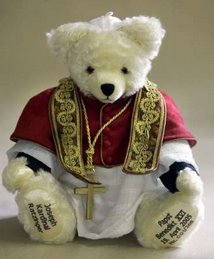From ZENIT. I found this rather interesting so thought I'd see what people's thoughts were.
ROME, SEPT. 5, 2006 (Zenit.org).- Answered by Father Edward McNamara, professor of liturgy at the Regina Apostolorum university.
Q: I have noticed in the past couple of years that priests are inserting into the Eucharistic Prayers the name of "St. Joseph" even though it is not a feast day of St. Joseph nor is he the patron of the church where the Mass is celebrated. In Eucharistic Prayer III there is the option of inserting the saint of the day or the patron, but in the other Eucharistic Prayers there is no place indicated for such an insertion. Eucharistic Prayer I includes St. Joseph. Is this practice of inserting "St. Joseph" in the Eucharistic Prayers acceptable? Also I have frequently heard the phrase "and religious" added to the part of the Eucharistic Prayers that prays for the clergy -- is that acceptable? -- S.H., Steelton, Pennsylvania
A: In recent years there has been a movement among some priests, and even some bishops, who have petitioned the Holy See to include St. Joseph in all of the Eucharistic Prayers, just as he is present in the Roman Canon.
This interest is probably inspired by the example of Pope Blessed John XXIII, who added St. Joseph's name to the Roman Canon in 1962 at a time when Eucharistic Prayer I was still the only canon in use in the Roman Church.
At the time, this addition caused great surprise as it was the first change made to the Canon in more than 1,000 years. The saintly Pope, however, considered that St. Joseph's unique role as spouse to the Blessed Virgin, foster Father to Our Lord, and patron of the Universal Church more than warranted this adjustment to the Canon.
The Pope did not live to see the many liturgical changes wrought as a result of his convoking the Second Vatican Council, including the subsequent addition of several new Eucharistic Prayers.
The practice of naming St. Joseph was not carried into the new prayers for many reasons, usually because the new ones, except for the third, mostly specifically mentioned only the Blessed Virgin Mary and afterward the saints in a general way, by classes (apostles, martyrs, etc).
It could well be argued that St. Joseph is in a class of his own and merits a special mention after the Blessed Mother. Someday, perhaps, the Holy See may see fit to give a positive answer to these petitions.
In the meantime, however, all priests should obey the approved texts and neither add nor subtract anything. Disobedience to Church law is certainly no way to honor the Church's universal patron who is characterized by silent obedience to all that God asked of him.
The same response can be given to those who add "and religious" to the Eucharistic Prayers, with the added note that it is not good ecclesiology.
The prayers intercede for the different sacramental orders in the Church. Religious who are priests are included among the clergy. All other religious are included among the baptized as "the entire people your Son has gained for you," but they do not constitute a separate sacramental order in the Church.
Subscribe to:
Post Comments (Atom)


1 comment:
I wish it had never been added to the Roman Cannon, which was the thin edge of the wedge of liturgical innervations, disregard for tradition and the subsequent miss mash that we have today.
Post a Comment